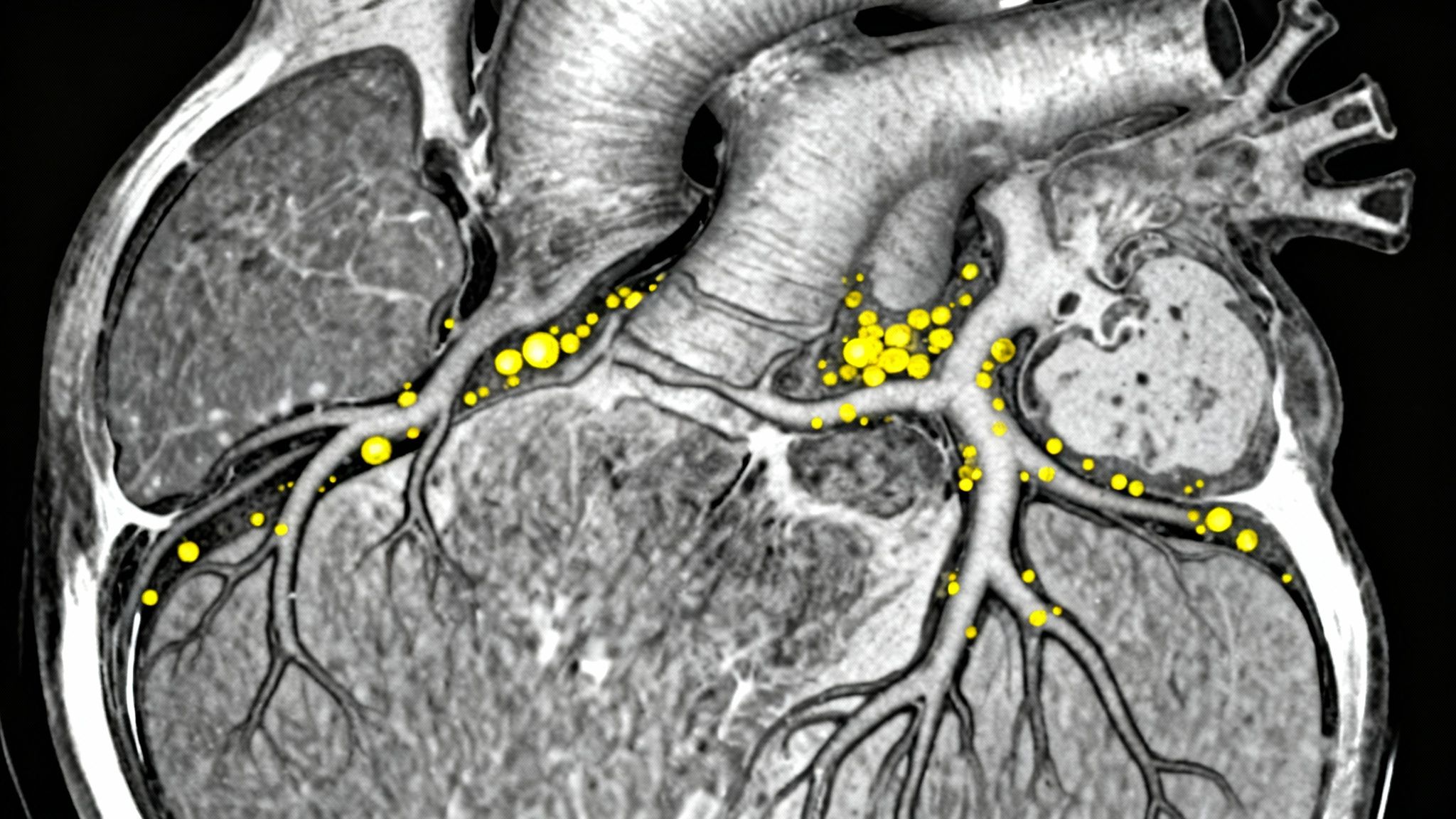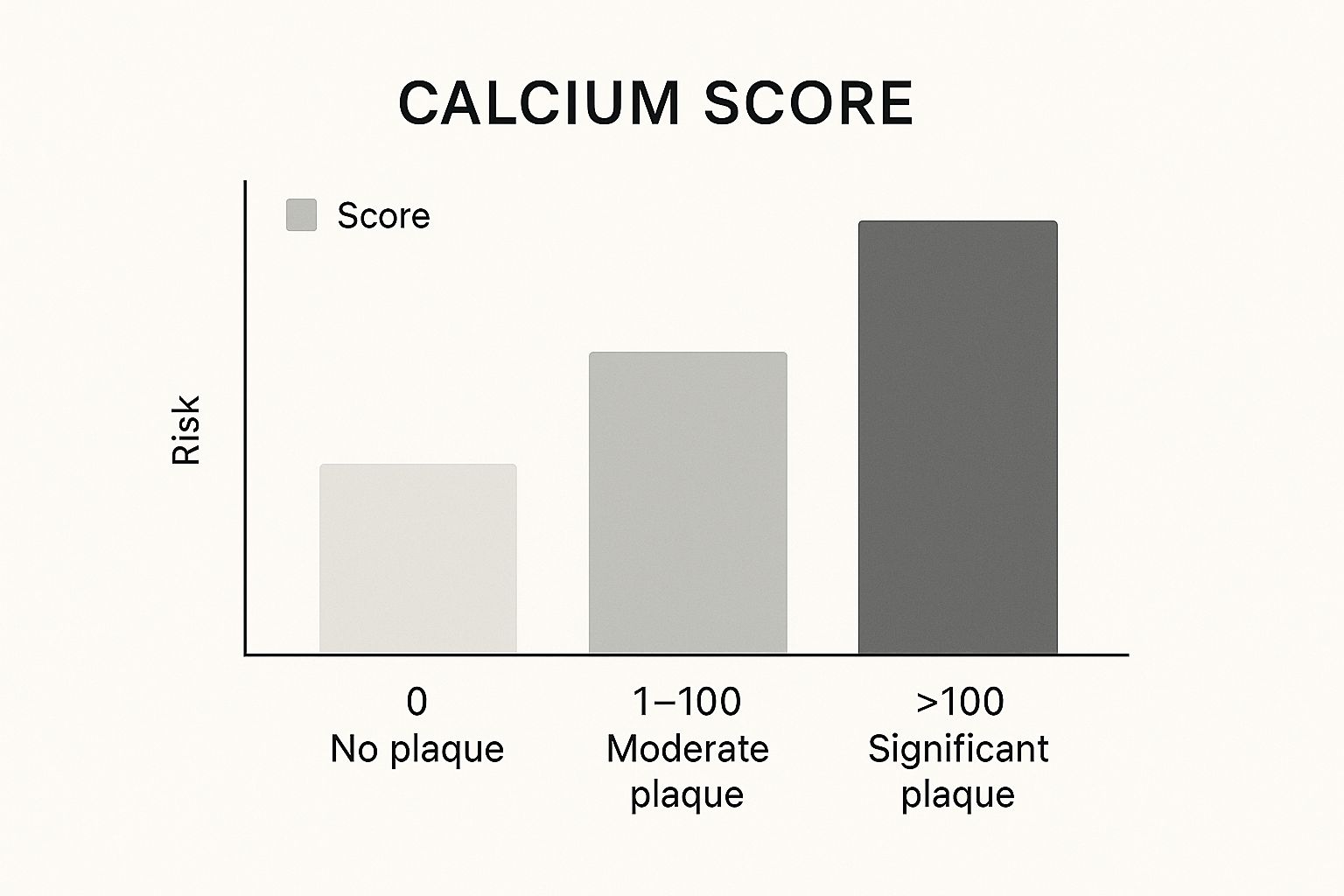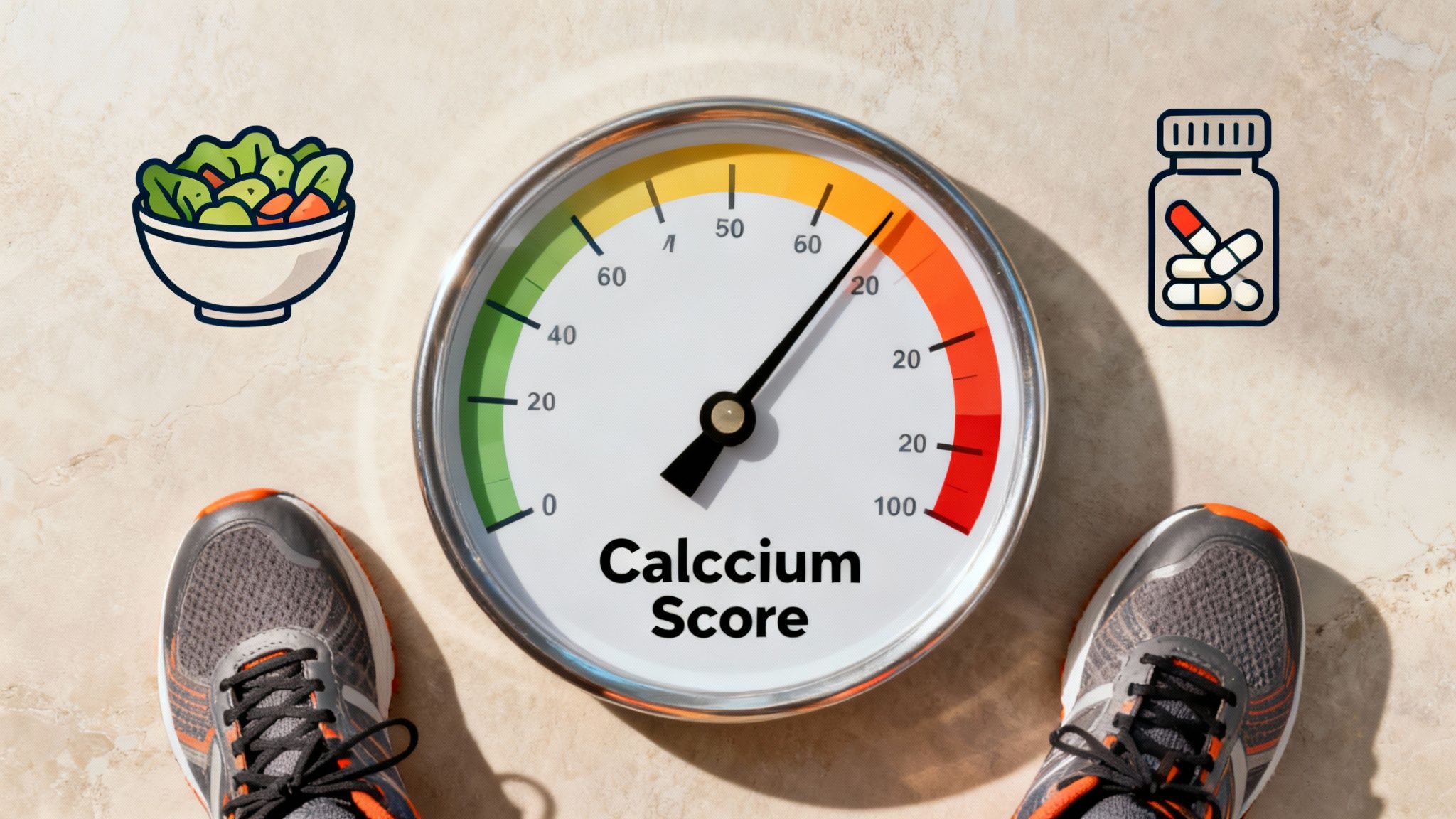Key Takeaways
Hello Heart Hero.
A calcium heart test is a straightforward, non-invasive scan that gives you a direct peek into the health of your heart's arteries. You might also hear it called a coronary calcium score. Think of it as a special snapshot designed to find tiny, hardened specks of plaque, potential early warning signs of heart issues down the road.
A New Way to See Your Heart Health

We get it. Thinking about your heart health can be overwhelming, especially when you feel like you are not getting the full picture from standard medical advice. It is natural to be a little skeptical and want clearer answers. This guide is here to give you just that, starting with a simple breakdown of what a calcium heart test really is.
Imagine this test as a tool that sees what things like cholesterol and blood pressure numbers cannot. While those metrics are definitely important, they do not always tell the whole story. The calcium score gives you a personalized look inside your arteries, painting a much more complete picture of what is going on.
Why This Test Is Different
This scan gives you a tangible number, your "score," which measures the amount of calcified plaque built up in your coronary arteries. This is not just another abstract medical result; it is a concrete piece of information that puts you in the driver's seat.
Knowing your score helps you and your doctor make much more informed decisions about your health. For those who want even more control, learning how to check heart health at home can also add valuable daily insights.
This simple scan helps replace uncertainty with clear, actionable information, giving you the peace of mind to take proactive steps for your long-term wellness.
What You Can Expect to Learn
This guide will walk you through everything you need to know, minus the confusing medical jargon. We will explore what the test involves and how it provides such powerful insights. Our goal is to arm you with knowledge so you can have more meaningful conversations with your doctor and feel confident on your health journey.
Here’s a quick look at what we will cover:
- A simple definition of what a coronary calcium score actually is.
- Who benefits most from getting this type of scan.
- How to interpret your results without feeling overwhelmed.
- Practical steps you can take based on your score.
What Is a Coronary Calcium Score Exactly?

Let's break down what a coronary calcium score really is and why it offers such a clear window into your heart health. It is a lot less complicated than it sounds, and it provides a kind of straightforward information that many people feel is missing from their regular checkups.
Picture your heart's arteries as clean, flexible garden hoses, easily carrying blood wherever it needs to go. Over many years, a sticky substance called plaque, a mix of fat, cholesterol, and other materials, can start to build up on the inside walls. This process is called atherosclerosis.
Eventually, some of this plaque can harden, or calcify. The coronary calcium score is a test designed specifically to see this hardened plaque. It uses a very fast, specialized CT scan to take detailed pictures of your heart and detect these calcium deposits. It is a simple, non-invasive scan that does not require any dyes or injections.
Translating Pictures into a Number
The result of the test is not some complex medical report; it is a single number. Your personal "score." This number quantifies the total amount of calcified plaque found in your coronary arteries. Think of it as a direct measurement of the "wear and tear" inside those critical vessels.
A calcium score gives you a real, tangible number to understand your risk. It cuts through the ambiguity, providing a clear picture of your artery health that isn't just based on general risk factors like cholesterol.
A score of zero is fantastic news. It means no hardened plaque was detected, signaling a very low risk of a heart attack in the near future. A landmark study actually found that getting a zero score is quite common. It revealed that nearly two-thirds (62%) of women and about 40% of men between 45 and 84 had no detectable calcium in their arteries. You can discover more about these important cardiovascular findings and what they mean for risk assessment.
On the flip side, a higher score indicates more plaque buildup and, consequently, a higher risk. This is not meant to be scary; it is meant to be empowering. It is solid information you and your doctor can act on.
Why This Score Matters So Much
What makes the calcium heart test so incredibly valuable is its directness. While things like cholesterol numbers and blood pressure are important pieces of the puzzle, they are indirect risk markers. They suggest what might be happening inside your arteries.
The calcium score, however, shows what is happening. It is direct, visual evidence of plaque, giving you and your doctor a much clearer basis for making decisions. This is not just another medical test; it is a powerful tool for taking control of your health with confidence and clarity.
Is the Calcium Heart Test Right for You?
The one-size-fits-all approach to medical advice can be frustrating. That is exactly why the calcium heart test is such a powerful tool. It is not meant for everyone, and that is precisely what makes it valuable.
This scan is most useful for people who are stuck in a 'gray area' of heart disease risk, where the next steps are not crystal clear. Think of it less as a routine screening and more as a specialized tool to bring clarity when factors like cholesterol levels or blood pressure do not paint the full picture. It gives you a direct look at what is happening inside your arteries, offering personalized data to help you and your doctor make smarter, more confident health decisions.
Who Benefits the Most?
The perfect candidate for a coronary calcium score is often someone looking to stop guessing about their heart health. While every person's situation is different, the scan is most effective for individuals who fit a specific profile.
Consider this a simple checklist to guide a more productive conversation with your doctor:
- Age: You are generally between 40 and 75 years old.
- Heart History: You do not have a known history of heart disease, like a prior heart attack or a stent.
- Risk Factors: You have one or more risk factors, like a family history of early heart disease, borderline high blood pressure, or you are trying to figure out the role of cholesterol in heart health.
This test is the ultimate tie-breaker. It is especially useful when it is unclear if someone really needs a medication like a statin. Instead of relying solely on generalized risk calculators, the calcium score provides actual evidence of plaque to guide that important choice.
A calcium heart test helps transform a generalized risk assessment into a personalized action plan. It answers the question, "Are my risk factors actually causing plaque buildup in my arteries?"
Armed with this information, you can have a much more focused discussion with your doctor. The goal is to see if you fall into the group that would benefit most from this clear insight. It is all about giving you the knowledge to ask if this is the right move for your unique situation, putting you back in the driver's seat of your health journey.
Making Sense of Your Calcium Score Results
Getting a number back from your calcium heart test is the first step. The real power comes from understanding what that number means for you, personally.
We get it. Seeing a score, any score, can feel a little nerve-wracking. But it is important to remember this is not a final diagnosis. Think of it as valuable information, a clear signpost that can help you and your doctor navigate the best path forward for your heart health.
Your score, measured in Agatston Units, is simply a way to quantify the amount of calcified plaque in your arteries. A higher score means more plaque. This is not meant to cause alarm, but to empower you with knowledge. It is a powerful call to action and a solid reason to focus on protecting your heart for the long run.
Breaking Down the Numbers
To make it easier, let’s look at the score ranges and what they typically suggest. Leading health organizations often use these ranges to help guide conversations about risk and what to do next.
For example, the 2018 Cholesterol Clinical Practice Guideline recommends categorizing scores into three main groups: 0, 1-100, and above 100. This framework helps doctors decide on treatment plans, like whether statin therapy is the right move. You can find more details in the guidelines published by the American Heart Association.
The infographic below offers a simple visual breakdown of these common score ranges and their associated risk levels.

This chart clearly shows how risk climbs as the score moves from zero to over 100, giving you a quick reference for where you might stand.
What Your Calcium Score Means
Here’s a simple breakdown of the calcium score ranges and what they generally indicate about your cardiovascular risk.
Understanding your score helps you and your doctor build a personalized plan, turning general health advice into specific, actionable steps tailored to your body. Your score becomes a key part of your medical history, highlighting why good clinical documentation improvement is so important for telling the complete story of your health journey.
A high score is not a destiny. It's a discovery. It is the starting point for a proactive conversation with your doctor about creating a plan that truly protects your heart. You can learn more about what is a cardiac event to better understand what these scores help predict.
How Your Score Can Guide Your Health Journey

A calcium score is so much more than a number. It is a launchpad for action. It gives you a powerful piece of personal information that can turn a generic health plan into one that is designed just for you. It cuts through the guesswork that so often comes with broad, statistical health advice.
This test provides the kind of clarity so many of us feel is missing from our healthcare. For example, a score of zero is strong evidence that your arteries are clear of hardened plaque. That good news can give you and your doctor the confidence to avoid or delay medications like statins, letting you focus on keeping up a healthy lifestyle.
On the flip side, a higher score can be the wake-up call you needed. It is tangible proof that it is time to get serious about your heart's future. For many people, that number is the final push to commit to meaningful changes they have been putting off.
Turning Your Score into Action
Your calcium score directly shapes treatment decisions, making them less about population averages and more about your body. It is all about using precise, personal data to make smarter choices for your long-term health.
A calcium score is a personalized road map. It doesn't just tell you where you are; it helps you and your doctor chart the best course forward to protect your heart.
The predictive power of coronary calcium scores is well-established, making them a strong indicator of future heart problems. In fact, both the American College of Cardiology and the American Heart Association recommend using these scores to sharpen risk assessments, especially for people between 40 and 75 who fall into an intermediate risk category.
Building Your Personalized Plan
With your score in hand, you and your doctor can build a targeted strategy together. This plan will likely involve a mix of diet, exercise, and other proactive steps tailored to what your body needs right now.
Your personalized action plan could include things like:
- Dietary Adjustments: Shifting focus to heart-healthy foods like fruits, vegetables, and whole grains.
- Consistent Exercise: Kicking off a routine that gets your heart pumping on a regular basis.
- Quitting Smoking: If you smoke, this is the single most impactful change you can make.
- Stress Management: Finding and practicing techniques to handle daily stress.
Understanding where you stand can also lead you to explore other ways to support your heart. Our guide on lifestyle changes for heart disease also offers plenty of practical tips to get you started.
Got Questions About the Test? We've Got Answers
It is only natural to have a few questions when you are looking into a new test to better understand your heart health. We get it. Let's walk through some of the most common questions we hear to help put your mind at ease.
Does the Calcium Heart Test Hurt?
Not one bit. The entire process is completely painless and non-invasive, a lot like getting a routine X-ray. You will just lie down comfortably on a table that slides into a large, doughnut-shaped CT scanner.
And for anyone who is not a fan of needles, you are in luck: there are no needles or injections needed. The scan itself is over in just a few minutes. All you have to do is hold your breath for a few seconds here and there so the machine can capture a crystal-clear image of your heart.
If My Score Is High, Can I Lower It?
This is probably the most important question people ask. Right now, the medical world does not have a way to reverse or lower the calcium score you already have. That hardened plaque is generally there to stay. But that is not the real point of the test. The true power of knowing your score is how it can motivate you to protect your future.
A high calcium score isn't a life sentence. Think of it as a wake-up call, a powerful signal that it's time to team up with your doctor, stabilize that plaque, and stop more from forming. This dramatically lowers your risk of a heart attack down the road.
Your focus, and your doctor's, will pivot to aggressively managing your heart disease risk factors. This usually means a combination of lifestyle changes (like diet and exercise) and, in some cases, medications that can help stabilize the plaque you have and prevent new plaque from building up.
How Often Should I Get This Test?
This is not a test you will need every year. How often you might get a repeat scan, if at all, really depends on your first result and your personal risk factors.
If your first score is a zero, which is fantastic news, your doctor might suggest another scan in 5 to 10 years, just to keep an eye on things. If your score is already elevated, repeating the test is less of a priority. Why? Because the high score has already given you the critical information you need to start taking action right away.
If you're using a wearable ECG device, our certified technicians are on standby to analyze your readings in minutes.










.png)
.png)